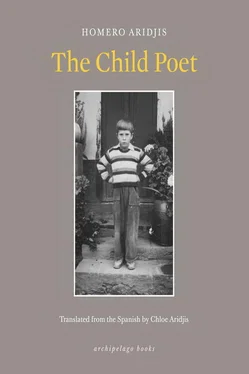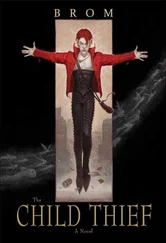My mother had phoned Father Felipe to come. In a waking moment I heard he was coming, and that he’d been very shaken by the news of my accident.
My mother told the nurses that he was a saint, and could perform the miracle of saving me. They and the nuns awaited his arrival. And the fate of my health remained on hold until then.
I was not doing well at all, the doctors said. But I didn’t feel as bad as I looked to them, and I let them hover around me as if they were working on someone else who wasn’t me. My spirit refused to be bullied by the helplessness of my body.
Injections and dressing changes pricked and pulled at me, and one arm hung for hours in the same position as the serum entered in drops.
Father Felipe arrived on Sunday morning, or at midday. Or on the following Sunday. Or I think he arrived, because I was asleep, and I couldn’t distinguish that well between what was happening around me and what I dreamt, between what I heard and what I thought I was hearing, for often my eyes would close as I lay listening to someone speak. The point is, he arrived. Or perhaps while saying Mass in Temascalcingo he came to Toluca in spirit. And I saw him. Or my parents saw him, and they said he’d been in the hospital chapel, and raising the chalice had asked God to grant me life. And that in the moment of the elevation he had known that I was going to live. And he told my mother, “Your son will live.”
Then he left. He had come to save me. My mother said so. And then he left.
Yet although I don’t remember having seen him in my room, I knew that on that Sunday he had been by my side.
Days later, my mother would tell people he had said I would become a saint, or I was going to do a lot of good for humanity, and that’s why I was going to live.
My mother searched in my eyes and in my actions for signs of saintliness. And I felt like somebody who had been on the brink of death and now received every hour of life as a divine gift.
My parents never left my side. My mother slept in a bed next to mine, and my father would spend the night sitting in a chair or pacing in the corridor when he couldn’t sleep, and most of the time when he heard me crying for water he had to leave the room and pretend to fetch some, for with that hope I could make it to morning.
He didn’t seem to sleep, or eat, day and night by my side, always awake when I opened my eyes. I had only to express a wish and he would immediately try to fulfill it, without protesting, without fuss. Seeing him there, a solitary figure — accompanied by my mother, an equally solitary figure — descending by night, rising by day, behind his love, behind his mortal shadow, I imagined the reality and the mystery of the Father.
Days followed the rhythm of sleep. During my absence I was sometimes on the verge of death, at other times out of danger. Slumber was interrupted by injections and the serum drip and by chance awakenings, which I’m going to talk about now.
Lying in bed with my eyes closed, I would hear the nurse open the door, move around the room, rummage for something in a drawer in the bedside chest, walk over to me, uncover me, give me an injection, cover me, walk away, close the door.
I suddenly woke up and saw my mother as an apparition, sitting on the bed, silently knitting, for I had dreamt that she was dying from a hemorrhage.
Falling asleep once more, I saw in a new dream two ladies from the village talking about me, about something that had happened to me and affected me greatly. My salvation, according to them, depended on the perfect pronunciation of the word “emeret,” which I couldn’t pronounce correctly. And so they instructed me in how to relax my body, pace my breathing, curve my tongue and articulate clearly, but my brain, overwhelmed by other words, mixed up the sequence of instructions, and the inflections in my voice didn’t harmonize with the inflections of my being, which was essential for the perfect pronunciation of the word. Different parts of my body were pronouncing the syllables incorrectly and with an awkward cadence … Until, suspended at some point in space, with an “e” and a “t” jammed between my lips, I learned that an “a,” which I didn’t know was in the word, was the key to its pronunciation. But as soon as I discovered this, the dream vanished.
My father was peeling an apple with his pocketknife while a grayish twilight filtered in through the closed curtains.
It was 7:10, or 8:25, or 4:00 in the morning. The room was dark, or, through the window, the midday heat shimmered.
Or a golden air would enter the room in diagonal columns that fastened themselves to the floor, as if my day would build itself or my night would lie down to rest on them, depending on whether it was dawn or dusk. Or to know what time it was, I would find my parents with my eyes; if they slept, it was daybreak, if they were standing, reading, or talking in low voices, night was falling.
Beyond my room lived my friends and my brother. Inside it, all that existed were the space of my suffering and the moment of my misfortune.
In bed, waiting, my being lay in doubt.
On the night of the second Sunday, lying awake at eight or so and noting a great weariness in my parents’ faces, I felt uneasy as I remembered that it was the time they usually went to the movies in Contepec and the beginning of their weekly entertainment, knowing that in order to look after me they had to be shut in as well. I also remembered my Sunday night doldrums after laboring my way up the day as if it were an exhausting ladder leading to floors where doors bore signs monotonously proclaiming, “CLOSED. Open tomorrow.” I would reach the height of tedium around eight, at which time, if the films were boring and I didn’t feel like watching them and my family and the maids were at the movies, I would roam the darkened village on my own, stricken by solitude, and, feeling lost outdoors, I would wander the corridors of our house and the streets.
It was the same when I roved anxiously from room to room at home, from the garden to the kitchen, from the store to the movie theater, morning or night, among friends or with my brother, seized by an ineffable melancholy, as if something within me wanted to speak but couldn’t, as if I had the wish but not the words.
I was the wounded one, the boy who’d been shot by a shotgun. The news had come out in the Sol de Toluca , stating that Dr. Alvear had saved my life by operating on me when I had thirty-two perforations in my intestine. Meanwhile, I was aflame with thirst. I slept and woke and I was thirsty. Treatment of my hand made me howl. The adhesive tape would stick to the raw flesh of my fingers, and the nurses had to hold me down to change the dressings. By day ten, I’d received more than eighty injections, and there was scarcely a part of my body that didn’t ache. A new pain was foretold each time the door opened, every three hours, and a nurse entered.
In the room next door they’d put a boy who had sliced off the fingers of his left hand with the guillotine at a print shop. I could hear his screams all night long, and for days his lamentations were the voice of the invisible patients in the hospital. His hand became infected for lack of penicillin; the nuns asked my father if he could buy some, which he did, and then went to visit the boy.
When the boy recovered, he came to thank me.
Each day the curtains were left open a bit longer. The room was lit by natural light. I began sleeping almost only by night. I was able to have chicken broth and drink noncarbonated water; I nearly finished off the bottle the first time my mother put one to my lips, trying to quench weeks of thirst.
My father brought fruit and magazines. One morning he arrived with books, King Thrushbeard and The Four Skillful Brothers . Within hours I’d read them both.
Читать дальше












